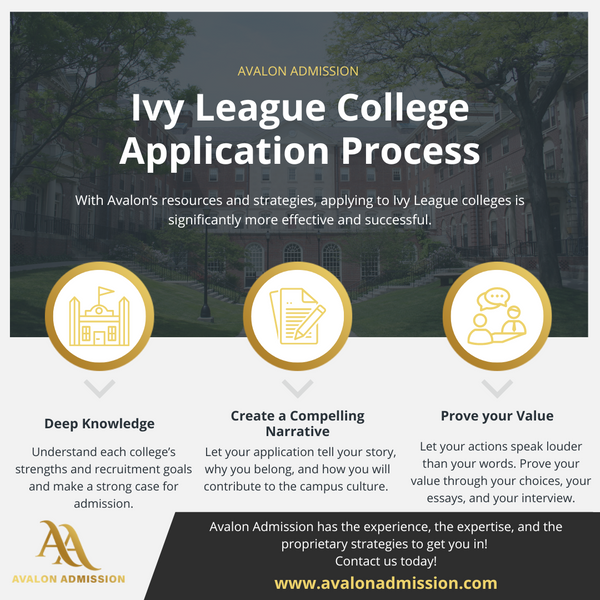Ivy League Colleges
Ivy League Colleges

the Ivy League Colleges
There are many excellent colleges out there whose names are not Harvard, Yale, Princeton, Dartmouth, Brown, University of Pennsylvania, Cornell, or Columbia. But Ivy League aura is unmistakable, and the education, connections, and resources these colleges provide are potentially life-changing. No wonder Ivy League admission is so challenging. Many students want to apply and admission rates hover between 3% and 11%. Yet, at Avalon Admission, our proprietary college admissions method has proven successful by over 90% of our students who have been accepted at one, or more, Ivy League colleges. When you need college admissions services to power up your Ivy League applications, you can count on Avalon to dramatically increase your likelihood of admission.
At Avalon Admission, we specialize in making strong cases for Ivy League acceptance by presenting students as individuals likely to make a positive difference in the world. We expertly weave together seemingly disparate elements of a student’s academic accomplishments and life experiences into a cohesive narrative that encourages a sense of confidence on the part of Ivy League admissions committees.
Neil Chyten's Insider Analysis of the Eight Ivy League Colleges
There are certainly commonalities among the eight Ivy League colleges, but there are also elements that make each of them unique. The commonalities include strong endowments, loyal alumni, diverse student body, world class professors, incredible connections in a variety of fields, an unsurpassed and life-changing educational experience, and campus-wide energy and enthusiasm among their student bodies.
Chyten’s Insider Analysis of Harvard
There are quite a few Harvard critics out there who are quick to point fingers at some of Harvard’s controversial policies. There are others who say that Harvard is all reputation and no substance. First, you must separate the Harvard corporation from the college, and I will only speak about the college. It is nonsense to say that Harvard is all reputation and no substance. In fact, I have ranked the quality of the major programs at the top 100 colleges in America, and no one has more “elite” programs than Harvard at 34. It is equaled only by Stanford in terms of number of elite-level programs. No wonder, Harvard is always at or near of the top of everyone’s list of best colleges.
Harvard is the oldest college in America, founded nearly 400 years ago in 1636. As such it is steeped in tradition, and unsurpassed in the quality of its programs, research, professors, and overall academic experience. It is relatively small, with less than 7000 undergraduates spread across more than 50 majors. Many of its classes are small, with less than 20 students. While earning your LAS (Liberal Arts and Science) degree, you can choose from over 50 concentrations, many of which are interdisciplinary. About a third of classes at Harvard satisfy core requirements, while the rest satisfy a concentration or dual concentrations. You would be hard pressed to find a concentration that is not considered among the best and most respected throughout the world.Furthermore, its research and its facilities are first class. For quite a while, it was relatively weak in engineering, but they have made tremendous strides over the past few years to the point where even its engineering programs are world class.
Getting into Harvard is challenging, but there is more than one pathway you can take. It certainly helps to have a high GPA and test scores. Short of that, you must demonstrate one or more extraordinary qualities. In all cases, you must demonstrate that you make smart choices, and that you are a person of high character, integrity, and honesty. One way of summing it up is that Harvard prefers students who are going to improve the quality of its campus right away or make the world a better place in the near future.
Chyten’s Insider Analysis of Yale
If you take a tour of Yale, it will quickly move to the top of your list. No college makes a better first impression. You may or may not love its campus. Emotions are mixed on that one. You will, however, be very impressed by its focus on individual growth and community. These are huge priorities at Yale. They do everything in their power to foster communities, concentrating much more on collaboration than on competition. As far as academics, I have 14 Yale major programs rated as “elite,” and another 24 rated as “great.” Only a handful of other colleges can match that level of academic quality. As for its resources—labs, technology, dorms, and other campus facilities—Yale is second to none.
Yale has around 6500 undergraduates. It is best known for its residential housing policy, its eclectic architecture, and its outstanding programs in the social sciences and performing arts. In particular, its History, Sociology, Anthropology Psychology, and Music departments are among the best in the world. Yale is consistently ranked in the top five colleges in America. Students live in one of 14 residential areas, and Yale believes that its residential colleges, including longstanding traditions and "secret societies" foster a strong sense of community and cooperation among students.
As it is at the other Ivy Leagues, admission at Yale is challenging. I have found that Yale gives greater consideration to students who are slightly non-traditional, such as those who have unusual experiences or talents or who have overcome tremendous odds to become successful in one or more areas. Another way you can think about it is that Yale prefers students who have had interesting lives. At Yale, academics are important, but they only tell part of the story.
Chyten’s Insider Analysis of Princeton
Princeton is nearly 300 years old, and so enjoys status as one of the oldest and most prestigious universities in the world. Its campus is gorgeous in a prestigious way. It is one of the smaller Ivies in terms of its student body, with around 5500 undergraduates. It is consistently ranked as one of the top 5 colleges in America. It is widely known as a leading research institution and offers 55 majors or “certificates.” Of those, I have rated 10 as “elite,” and another 26 as “great.” Princeton's School of Engineering and Applied Science is considered to be one of the best undergraduate engineering programs in the country.
A large percentage of Princeton's classes have less than 20 students, and feature instruction from an impressive faculty made up of world class professors, Nobel laureates, PhDs, and some of the most respected minds in their respective fields. It has one of the lowest teacher-to-student ratios in America at 5:1. Like many of the Ivies, Princeton is highly ranked among a wide variety of disciplines, including Social Science, Science, Engineering, Public Administration, and the Arts. Its academic focus is largely cross disciplinary, encouraging students to become immersed in a wide variety of courses across many different fields.
In addition to a strong academic record, Princeton’s admission committee looks for major accomplishments, such as successful research, published articles, awards, and leadership. Like other Ivy League colleges, it gives preference to students with high GPA and test scores but will also consider students who have successfully dedicated their time to major pursuits in their areas of academic interest, athletics, or the arts. They are particularly fond of accomplishments in engineering achieved while in high school.
Chyten’s Insider Analysis of Columbia
Columbia is nearly 300 years old, and like many of the other Ivies it is small at only 7500 undergraduates and offers a world-class educational experience. It is composed of three schools: Columbia College, The Fu School of Engineering, and the School of General Studies, the last of these is mainly for non-traditional students such as those returning to their education after having taken some time off for various reasons. Unlike most colleges, you can apply directly into Columbia’s Fu school of engineering, or choose a combined plan where you attend an affiliated liberal arts college followed by a year at the Fu School of Engineering, and receive a liberal arts bachelor’s degree and a master’s degree of engineering. Academically, I have rated seven of its major programs as “elite,” and an astounding 36 programs as “great.”
Many people love the fact that it is a true campus school located in the heart of New York City. As such it offers students the best of both worlds, with seemingly unlimited resources and a number of highly ranked programs including Social Sciences, Biological and Biomedical Studies, Engineering, Writing, Film Studies, Computer and Informational Science, and Math – all fueled by its proximity to the world’s Arts and Commerce hub of New York City. On the downside, some people consider the campus to be small and overcrowded.
Chyten's Analysis of The University of Pennsylvania
The University of Pennsylvania is nearly 300 years old and was founded by none other than Benjamin Franklin. It is the second largest Ivy League school with an undergraduate population of over 10,000 students. Penn, as it is referred to, is home to four undergraduate schools: The College of Arts and Sciences; The School of Nursing; Penn Engineering; The Wharton School of Business. While all four schools are highly regarded, the Wharton School is considered by most to be the top undergraduate business school in the world. Because Penn encourages a diverse academic experience, most students take courses across many, if not all, of the four schools. Some of its interdisciplinary programs are: Fisher Program in Management and Technology, the Huntsman Program in International Studies and Business, and the Vagelos Program in Life Sciences and Management. Its two most popular programs are Business and Social Science.
Chyten’s Insider Analysis of Cornell
Cornell is the “youngest” and largest of all the Ivies. It was founded in 1865 and has a total undergraduate population of around 15,000 students. It sits on a picturesque campus in Ithaca (upstate), New York. The undergraduate college is made up of seven schools, including the School of Agriculture and Life Science, the College or Architecture, Art, and Planning, the College of Arts and Sciences, SC Johnson School of Business, the College of Engineering, the College of Human Ecology, and the Schools of Industrial and Labor. Relations. It has world class programs in Agriculture, Hotel Administration, Applied Social Sciences, and Labor Relations. Academically, I have rated 10 Cornell major programs as being “elite” and 27 major programs as being “great.” There is little doubt the students work hard at Cornell. It is a very competitive academic environment.
Socially, Cornell has more than 1000 clubs and a large Greek system which comprises more than 60 fraternities and sororities. What some consider to be Cornell’s weakness, I consider to be its strengths. Yes, it is in rural upstate New York, so it is not particularly close to a city of any magnitude other than Ithaca. That makes it a “campus school.” What I like about campus schools is that students stay and find all their activities on campus. As a relatively large school, Cornell offers lots of activities—everything from movies, concerts, and parties to a variety of restaurants. Many of the party-related social activities are found off-campus at the fraternities and sororities. I acknowledge that this is not everybody’s cup of tea.
From an admissions perspective, Cornell prefers students who have challenged themselves academically, including undertaking internships and research projects. They also prefer students who have had lots of school involvement in clubs, sports teams, and community service.
Chyten’s Insider Analysis of Dartmouth
Dartmouth is the smallest of the Ivies with an undergraduate class of 4400 students. It is located on a picturesque Campus in Hanover, NH. It was founded in 1769. A large percentage of its students are involved in Greek life as members of a fraternity or sorority, which collectively form the primary social hub at Dartmouth. The most popular majors are Economics, Government and Computer Science. Dartmouth is well known as a leading research institution and has created a robust research infrastructure. As such, most undergraduates participate in meaningful research, even what might be considered graduate-level research, with their professors. Students can elect majors, modified majors, dual majors, or majors combined with minors. I have rated one Dartmouth major program as “elite,” and 21 major programs as “great.” One of the reasons it has a small number of elite programs is that it offers fewer programs than some of the other Ivy League schools and larger universities.
Dartmouth is well known for the relationships that students form with their professors. Indeed, professors often become mentors, providing contacts and connections to help students find meaningful careers after graduation. Also, Dartmouth students are highly respected in the graduate school admission process at elite universities across the country.
Dartmouth admissions prefer students who have been heavily involved in school activities including sports, clubs, school spirit, and performance. Because it is a small school, it hopes and expects each student will become involved in several extracurricular programs on the Dartmouth campus.
Chyten’s Insider Analysis of Brown University
Brown University was founded in 1764 and has a total undergraduate population of 7,400 students. It is best known for its Open Curriculum by which students select courses of interest before diving into their focused concentration, rather than being required to take a predetermined core of classes, as is the case at other colleges. The most popular majors at Brown are: Computer Science; Econometrics and Quantitative Economics; Entrepreneurship/Entrepreneurial Studies; Biology/Biological Sciences; and Engineering. Of these, I have rated one major program as “elite,” and 19 major programs as “great.”
Brown has a picturesque, tree-lined campus located in Providence, Rhode Island which is a decent sized city. It is considered to be a low stress environment, with collaboration emphasized over competition. Its grading system is unique in that students can elect to be graded A, B, C, or merely “Satisfactory.” Brown does not calculate GPA.
From an admission perspective, Brown University is rather an enigma. At times, it may reject highly qualified candidates in lieu of those they feel will add to the campus diversity and culture. It seeks to create a highly diverse culture with students from many backgrounds and various walks of life. They prefer students who have demonstrated leadership, social conscience, and who have demonstrated an ability to “fit in” to various social environments.
Ivy League Acceptance Rates
Acceptance rates at Ivy league schools are between 4% and 10%, which in practical terms means that they reject 10-25 times as many students as they accept. While getting into the Ivies is obviously quite challenging, knowing how to present students in the best possible light can significantly improve the odds of success. For students with all-star statistics (test scores, GPA’s etc.), having anything less than stellar applications can negatively impact the likelihood of acceptance. Applications prepared by Avalon Admission's team of experts have yielded significantly better outcomes, including far more likely acceptance into Ivy League colleges and universities. Some years, nearly 100% of our students who apply to Ivy League colleges receive at least one Ivy League letter of acceptance.
Recent Acceptance Rates* (RA, ED-REA):
*Please note that there are many factors considered in admission decisions and that these percentages may not apply to you
- Harvard 3%, 3%
- Yale 5%, 5%
- Princeton 4%, 15%
- UPenn 5%, 9%
- Dartmouth 5%, 19%
- Columbia 3%, 12%
- Brown 4%, 15%
- Cornell 5%, 19%

What to Know About the Ivy League Admission Process
Admission into the Ivy League is highly competitive and often futile even for students with high GPAs and test scores. Ironically, being a valedictorian does not guarantee success as far more valedictorians are rejected than accepted by Ivy League institutions. For Harvard and the other seven Ivy League colleges, it takes planning, research, and strategies to gain admission. with over 38 years of Ivy League experience, Avalon Admission has created college admission counseling strategies that make the process as stress-free, streamlined, and successful as possible, dramatically shifting the odds in favor of Avalon Admission students, especially for the nation's most competitive colleges.

Deep Knowledge
Each Ivy League college has its own priorities, requirements, and recruitment goals. So, it is important to research each college to determine how to present yourself through your application, even down to your areas of academic and activity interests. The difference between Ivy League acceptance and rejection often comes down to the choices you make throughout high school, the consistency of information in your application, and the strength of your interview, essays, and recommendations.

Create a Compelling Narrative
To Ivy League colleges, students are commodities; for every student submitting an application, there are 20 other more-or-less similar students vying for the same seat. The question you should ask yourself is, "How can I compel these top colleges to select me over those other 20 highly qualified students?" The answer may be found in your narrative. Creating a compelling narrative is not just how you present yourself in your essays, it is also how you fit into the ecosphere that is planet Earth. This critically important aspect of college admission is the exclusive domain of college admission professionals, a multifaceted and highly nuanced skill at which Avalon Admission excels.

Prove your Value
In Ivy League admissions, actions speak louder than words. You can't talk your way in; you must prove that you belong. This is done through the choices you make, by demonstrating that you take advantage of opportunities you are given, by using time to explore passions and to help others, to rise to occasions that present themselves, and to face and conquer challenges head on.

Avalon Admission wants to help you succeed in your venture of applying to Ivy League colleges. Navigating the Ivy League admission process can be daunting, but with the right choices and strategies, it is possible to achieve your dream of attending an Ivy League institution. For more information, contact us today to schedule your free 30-minute consultation!
